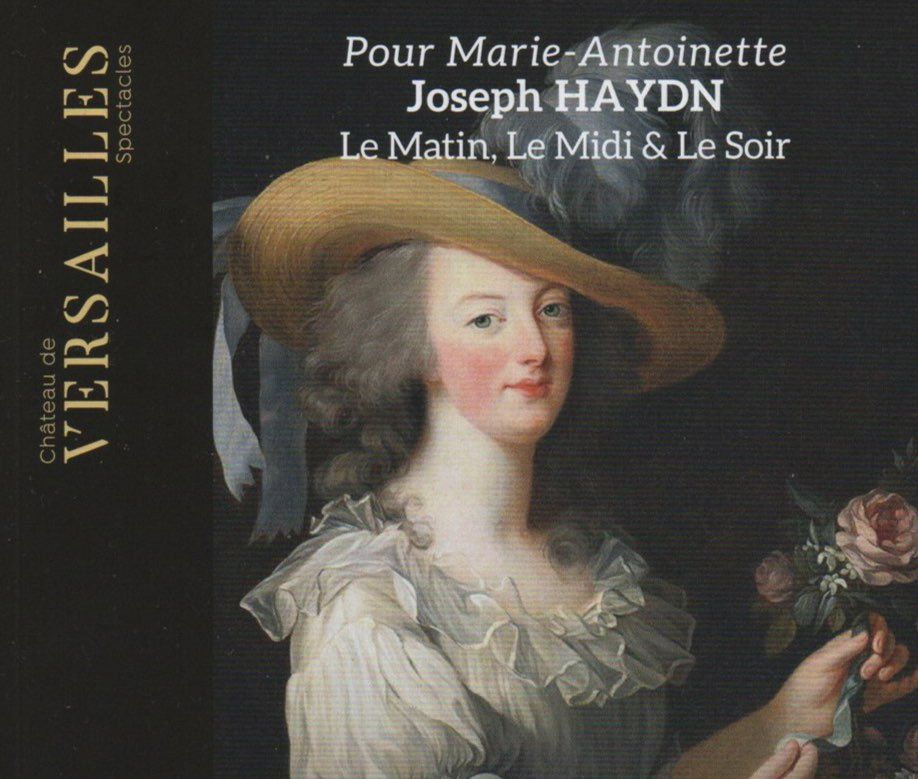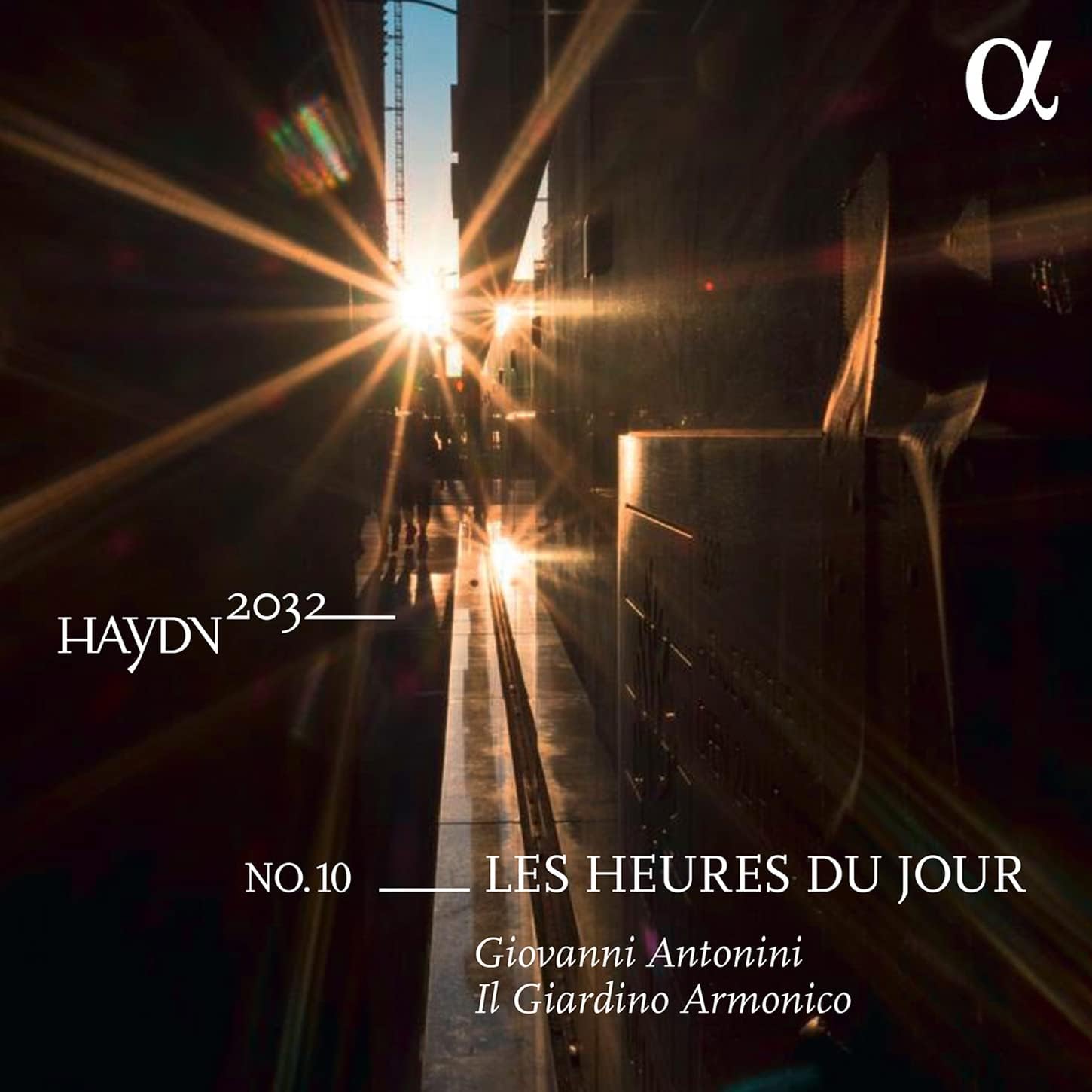Pour Marie Antoinette: Haydn Symphonies Nos. 6-8, Plewniak vs Antonini

Stefan Plewniak is a remarkable conductor. He was in charge of the recent run of Napoleon's favourite opera, Zingaelli’s Giulietta e Romeo, at the Opéra Royal, Versailles (review to follow in the print publication Opera Now). This disc is released broadly to coincide with that (it came out October 6) and the performances of the Orchestre de l'Opéra Royal in both seem remarkably energised by Plewniak. No surprise if anyone has seen him in action. It is fair to say his conducting is energetic (if anything, it put me in mind of the Danish conductor Lars Ulrik Mortensen! - whose Concerto Copenhagen provided a fine disc of Christmas Concertos on Naxos, reported on by Classical Explorer here). But in the Zingarelli, as here, there is no doubting Plewniak gets result. His disc of Haydn symphonies is one of the most energising discs of Haydn symphonies out there.
The disc presents a trio of symphonies that reflect the progress of a given day: morning, noon and night (Le Matin, Le Midi, Le Soir).
Plewniak's morning creeps in from true silence (depending on your volume settings, you might wonder whether the music has in fact begun!). It is clear even before the flute initiates the Allegro that this is a performance of maximal dynamic range, one that concentrates on the importance of gesture and drama. The recording supports this approach, allowing for stunning levels of detail. Primarily, strings bite like nowhere else. Excerpts aren't available on YouTube but are on Spotify, so click the link below the review to hear tase wonderful performances.
That same held-breath atmosphere that opened the first movement recurs in the Adagio (with super contributions from lead violinist Ludmila Piestrak), coupled with a real sense of almost dance-like eloquent.
Strangely, the Menuet feels slightly restrained - until you get to the extraordinary bassoon and cello solo, when Haydn's invention seems to fly. And some of the recording spotlighting in the finale might not be to everyone's taste. But this is a performance of the utmost vitality and élan. In capturing the very essence of Haydn's unfailing invention, this performance alone is to be cherished.
The ‘Midi’ symphony begins with a long violin solo, answered by solo cello (Katarczyna Orchon). ‘Le Midi’ has all the expansiveness of an extended lunch. Some of the most arresting sounds are in the Menuet, with its lower strings and pairs of horns set against each other (and also horns in full hunting mode in the Menuet proper). The finale is properly raucous and energised
This disc is not only the Haydn symphonies mentioned - as an interlude between Nos. 7 and 8, we have the “Dance of the Blessed Spirits” from Gluck’s 1762 opera Orfeo ed Euridice performed on harp by Clara Izambert. It is a ravishing performance, delicate, intimate, and beautifully recorded.
Finally, ‘Le Soir’.
The booklet notes for the Versailles release tell me what I did know - that the first movement is monotheistic, so there is only one main theme (and no second subject, therefore) - but also (this is the bit new to me) that the theme is a quote from Gluck’s Le Diable à quatre (1759), specifically the aria ‘Je n’aimais pas le tabac beaucoup’ (I don't much like tobacco) - so now that Gluck harp solo makes perfect sense!
The Andante again reaches out in another direction, this time forwards, to the theme of slow movement of the String Quartet, Op. 33/2 (1781):
There is almost the texture of a string quartet in Plewniak’ s extraordinary reading of ‘Le Soir’s slow movement, Piestrak and Cichon's violin and cello solos (respectively). This slow movement is almost as long as the other three combined, and perfectly sustained here.
The concertante element heard in all three symphonies continues in the Menuet, with a double-bass solo from Davide Vittone.; the finale (‘La Tempête’) blazes with energy.
This Versailles disc is linked to the ballet music for Marie Antoinette from the Ballet Melandain Biarritz (see this link for more details) performed at Versailles in 2022:
Currently, this disc is 16% off at Amazon at the link below.

The competition in recent years comes from the established Baroque band Il Giardino Armonico and Giovanni Antonini on Alpha on a disc called Haydn 2032, No. 10, Les Heires du Jour, referring to a project that looks forward to the 300th anniversary of the birth of Josef Haydn - the Haydn Stiftung, Basel, in conjunction with the Alpha label, is offering a complete symphony cycle (107 symphonies in all). Recordings are shared between the present ensemble and the Basel Chamber Orchestra. Concerts will be presented across Europe in addition to the recordings.
Without the context of the Versailles recordings, these performances might be though of as full of energy, and yet Plewniak's volcanic approach makes Antonini sound positively reserved at times. The YouTube videos of Antonini include score:
The slow movement is lovely, Stefano Barneschi superb in the violin solos (he plays on a Giacinto antagiuliana from Vincenza, 1830):
There is some superb woodwind playing in teh Menuetto and Trio, firstly from the flute of Marco Brolli (a 6-key flute by M. Wenner after a Dresden 1790 instrument by A. Grensen) and particularly, the bassoon of Michele Fattori (a 9-key instrument byPeter de Konnigh after a Grenserm also from Dresden, c. 1806).
Brolli shines again in the finale, and there is some lovely, rustic horn playing from Johannes Hinterholzer and Edward Deskur on natural (valveless) horns, although here Plewniak's energy shines the brighter:
When it comes to lunchtime, ‘Le Midi’ is heard in a vigorous performance, and yet it is hard to imagine anyone matching Plewniak. Antonini has a little more Haydnesque grace, a little more warp and weft, which some may prefer:
I do like the sense of recitative and aria for solo violin in Antonini's second movement though:
yet Plewniak's Menuet is markedly more impressive, more raw. That Trio mentioned above, feels more experimental in Plewniak's hands, too:
The finale is bright and breezy, but not up to Plewniak's level for breeziness (he's more of a small gale):
And to round off this trio of Haydn symphonies (but not the disc). ‘Le Soir’. It is the slow movement here that shines the brightest, with Antonini firmly in Plewniak's shade in the first movement. Here's the second movement:
This is gentile, even polite, but it works. Even here, Plewniak drills deeper into Haydn’s expressive world though. I do like the crispness of the acciaccaturas in the Menuet though:
Antonini's finale is bright as a button, but perhaps a touch less fiery than Plewniak's. There is a generous filler, though, Mozart’s Serenata notturna, K 239, given in a nicely variegated performance. Mozart plays off martial elements against a solo concertante group in the first movement:
The booklet notes suggest the Serenata was composed for a masked ball held at Salzburg Town Hall, one that, on February 14, 776, had the theme of recruiting volunteers for the American War of Independence. Hence the martial element. The finale, a Rondeau, is full of solo/tutti contrasts and includes an Adagio recitative:
Much though I enjoyed the Antonini Mozart Serenata notturna, it is Plewniak that wins the day.
